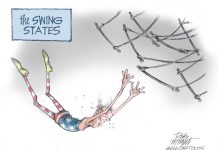What we consider pain and suffering has dramatically shifted over the last few decades. What may have been viewed as a simple inconvenience, or as a natural consequence of living in an earlier time, has shifted on a relative scale from inconvenience to suffering.
If our internet service goes down, we are suffering.
If we keep score at our kid’s game and there is a loser, we are suffering.
If we don’t have options for every dietary restriction or preference, we are suffering.
If someone disagrees with us or doesn’t like our opinion, we are suffering.
If we don’t get the latest iPhone, we are suffering.
I don’t discount the fact that we truly believe we are suffering in those instances, but our sliding scale of suffering has significantly shifted. We now have a lower threshold for what causes us to suffer.
But it is not as if any one of the examples above independently led to this shift. It has been the slow aggregation and evolution of how we perceive and internalize inconveniences and those things that cause us mental discomfort. What ought to be regarded as small bumps in the rugged road of life have now come to be perceived and internalized as pain and suffering.
The reason I am going to such lengths to describe how our collective consciousness has evolved on the relative suffering scale is for this reason: I believe that if we have a hard time coping with those things that were once regarded as simple inconveniences or those things that cause a mental discomfort, we will not have the mental, emotional or psychological capacity to deal with deeply traumatic or extreme circumstances, nor will we know how to walk alongside others who are going through more traumatic circumstances.
Being that our perception of what constitutes pain and suffering has changed, deeply traumatic circumstances will put us into territory we have never previously traveled and will lead us to pursue means that alleviate the pain, that numbs our suffering.
And that is where we are today.
We do it by losing ourselves and escaping this present reality through entertainment, gaming, eating, illicit drugs and alcohol to name a few.
And we do it at a great cost to ourselves and to our relationships.
Earlier peoples did not have as many avenues to avoid or escape suffering. They had to learn how to live in and through their suffering, and as a result, there was a resilience in how they learned to persevere, a depth in the development of their character and a strengthening in their understanding of how to be a community that suffers alongside one another.
I often wonder if it is possible to get to that place. Even more, I wonder how we can get to that place as faith communities.
For suffering, and suffering well, ought to be the defining disposition of the church, as we are communities of the suffering servant.
There is a line of wisdom in the letter written to the church in Rome in which Paul writes that, “suffering produces perseverance, perseverance creates character, and character leads to hope.”
It is the simple realization that, no matter the degree of suffering we are experiencing, there is something that happens to us at the core of our being in which we are being forged with a depth and resilience into something invaluable and useful and beautiful, when we are willing to face our pain and walk headfirst into our suffering.
And the only way this begins to happen is in a posture of humility that leans into the spirit.
I know this is counterintuitive to how we respond to pain and suffering in our collective culture. But, we have to be honest in understanding that our surface-level, bandage approaches leave deep, unresolved, festering wounds out of which we begin to live in unhealthy ways. And this leaves us as people without the ability to heal and without the resolve to persevere. This leaves us as people without a depth to our character. And then leaves us as people without hope that there is anything left beyond our pain and suffering.
But I am not sure if we have ever thought this way about pain and suffering.
One may think that the easy solution is for us to simply have a change in perspective, to come to our senses and realize that “inconveniences” and “mental discomfort” is not real suffering.
But, I am not sure that the answer is found in shaming ourselves for not having the right perspective. Continually ranking and then comparing what constitutes an inconvenience versus suffering in one’s life misses the point.
If we are to learn to suffer well, we must begin to learn no matter the depth or degree of our suffering.
For how will we know how to suffer well in deeper and more traumatic situations, if we have not learned how to suffer well through our inconveniences and mental discomforts?
And that leads us to our faith communities and how we are leading people in their suffering.
But we have so inoculated and insulated ourselves from the depths of pain and suffering in our churches, just like our culture, that we are not quite sure what to do when we experience it or when it is in our midst.
And in the community of the suffering servant, if we are not setting the example of how to suffer well in any and all situations or circumstances, then we are perpetuating the problem.
As people of faith, we are those who, in humility, aspire to recognize that God is not the cause of our pain and suffering, nor is God distant or indifferent, but is ever-present with us in our pain and suffering.
We are those who aspire to know that our heavenly father is intimately holding us moment by moment, teaching us a steadfast reliance and giving us the strength to persevere each day, even when we do not have strength of our own.
We are those who aspire to understand that God is working through our pain and suffering, not by magically taking it away, but by bringing to life a genuineness, an authenticity and a trustworthiness that can be used for the sake of others.
And we are those who aspire to know that the pain we have held, and what suffering we have endured, is moving toward a future in which God wipes away our every tear, heals our brokenness and restores all things.
Brandon Andress of Columbus is a former local church leader, a current iTunes podcast speaker and a contributor to the online Outside the Walls blog. He can be reached at his website at brandonandress.com.




